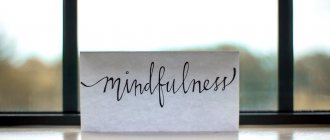If you are constantly stressed, do not get enough sleep and feel that your vitality is running out, you need a reboot. Try practicing mindfulness.
“Mindfulness is a miracle that allows us to manage ourselves and maintain our identity” (Thich Nhat Hanh)
With permission from Potpourri Publishing, we are publishing an excerpt from Brooke McElree’s book “Living Slowly” about what mindfulness is and how to practice it.
What is mindfulness?
Before we talk about why and how to gain mindfulness, it is worth clarifying what it is. From a psychological point of view, mindfulness is a state in which a person monitors his current experiences, focusing on the present moment and without being distracted by thoughts about the past or future. It represents the ability of consciousness to introspect (internal observation) of its activities. This means that individual experiences are perceived by the person directly and as they are. In most cases, awareness is aimed at internal states, such as intuition or sensory perception of events occurring in the external world.
Philosophy also has a lot of interesting things to say about mindfulness. For example, Rene Descartes, who became one of the first to study consciousness from a scientific point of view, formulated the famous formula “I think, therefore I am.” And by thinking he understood everything that a person does consciously - through introspection. From here we can draw a simple conclusion: man exists, i.e. lives only when he is aware of himself and everything that happens around him.
In addition, religions (for example, Buddhism) and many spiritual teachings also talk about mindfulness. The works of such famous people as Osho, George Gurdjieff, Carlos Castaneda, Jiddu Krishnamurti, Victor Pelevin, Sri Aurobindo, Porfiry Ivanov, Peter Uspensky are devoted to the development of this ability in one form or another. Many amazing books have been written on this topic by world-famous authors (Mark Williams, Danny Penman, Michael Chaskalson, Laurence Levasseur, Richard Moss, Eckhart Tolle and others).
Thus, the topic of awareness worries a huge number of people, and not only those who have devoted themselves to spiritual quests, but also those who simply want to develop and improve their lives, achieve goals and personal growth, to better understand themselves and the people with whom they communicate. . But let's talk in more detail about whether it needs to be developed at all and what it gives. You can start with this video.
Mindfulness, or awakening consciousness
Mindfulness, the awakening of consciousness by noticing minimal changes in the physical, emotional and mental planes, is practiced in psychology. But the very concept of mindfulness was not an invention of psychological science at all, but is a borrowed concept that originates from the practices of ancient philosophical teachings.
Psychology skillfully applies this concept to create positive changes in the psycho-emotional state of a person and, therefore, uses it as an applied method for correcting the psyche, forgetting that awareness can and in fact is valuable in itself. It is a thing in itself, but not in the sense of its unknowability, but in the fact that it is valuable in itself, regardless of whether we know about its existence or not. She is.
If we accept awareness as an integral fact of existence, then we let it into our lives, enlivening and filling the world around us with meaning. If we do not recognize the concept of awareness, it nevertheless does not cease to exist in reality, but at the same time our life flows in an unconscious way, by inertia. A person is more than a set of physiological and mental functions. He experiences the world through awareness. The more aware he is, the more everything becomes open to him. It is good that people are increasingly thinking about this and developing their ability to understand through various methods and techniques.
Do you need to be aware and why?
The state of mindfulness looks very attractive, but before you begin to develop it, everyone must decide for themselves whether they have the courage to lead a conscious life. This presupposes a sober view of things, a complete rejection of self-deception, a clear understanding of one’s actions and actions, and responsibility for all their consequences.
To become a person who has all these qualities, you need to be truly brave. And only if a person is ready to take off the “rose-colored glasses” and see the true world and the true self in it, can we talk about developing awareness. Otherwise, nothing will come of it, and he will return to such pleasant illusions and self-deception.
Are you ready to pay this price? If yes, read on.
What will awareness give you?
We can talk about this endlessly, but we will try to give the most convincing arguments (by the way, read our article “Mindfulness and its benefits”).
So, a conscious person becomes more responsible, and not only in relation to his loved one, but also in relation to those around him. He begins to think about his words, actions and reactions, and make them such that they do not harm absolutely anyone, thereby turning a chaotic existence into a harmonious life.
Being aware, a person solves many life issues much more effectively and copes with problems and difficulties, adequately and impartially analyzing all their aspects. In addition, mindfulness gives you the ability not to be afraid of failures and troubles, but to enjoy life, paying attention to its seemingly most insignificant manifestations, such as a breath of wind, the first snow, summer rain or sunrise.
Of course, relationships with loved ones become something very important and valuable. Ordinary people turn out to be dear to the heart, and feelings that have lost their former passion flare up with renewed vigor, revealing many new facets. But let's not dive into the lyrics.
The development of awareness is the key to understanding what is happening around and inside us, the path to recognizing false strategies and beliefs, a tool for identifying unconscious mental reactions, the ability to make more sober conclusions and not distorted by internal states, and effectively plan your actions.
Most people either do not suspect or do not attach importance to the fact that their behavior is determined by mental reactions based on views, concepts, beliefs and attitudes formed in the course of life. They become a prism or even a distorted mirror through which we look at life, the world and other people. But, unfortunately, we see not what actually is, but a projection distorted by our perception.
For example, a person, unconsciously obeying his habits and beliefs, instinctively perceives people with distrust and aggressiveness. There may be a negative experience behind his back, or someone may have inspired him that people cannot be trusted. This is the distorted mirror through which he sees and evaluates even good people. Similar and modified situations can be observed in other areas of life: someone gets angry when they interrupt him, someone feels offended when they make fun of him, someone curses life when obstacles come his way, etc.
The well-known behaviorist formula “stimulus-response” works here, when the human psyche mechanically responds to external stimuli. And such emotional impulses, automatic reactions and reactive actions make up our lives. It’s no wonder that every now and then there are “negatives,” “whiners,” “evil people,” and distrustful people who are tired of life and don’t believe in anything good and bright.
By placing ourselves in a position of dependence on momentary emotions and reactions, we begin to live like robots or unconscious organisms. We lose the ability to adequately perceive phenomena and events, are guided by ineffective behavioral strategies and patterns, are unable to analyze even our own actions and reactions, and become slaves to emotions and habits.
Moreover, we can say with regret that a person who lives unconsciously will constantly repeat himself in his thoughts and actions, being deprived of the ability to change himself, situations and life in general. Acting stereotypically, as he is used to, he may come to the conclusion that life is pain and nothing can be changed. And even if he wants to change everything and begins to take drastic measures for these changes, behavioral automatism will still act over and over again, leading to the same result.
The reason for all this is our unfortunate prism, which distorts our view of the world. But this is not a reason to give up, because this prism can be changed - through the development of awareness in every thought, in every word, in every reaction, in every action. Then negativity and dullness will be replaced by positivity and bright colors, automatism will be replaced by tracking, mechanistic actions will be replaced by thoughtful steps, emotional and unconscious perception will be balanced and conscious. And we invite you to start making these changes with us.
How to get all these bonuses
Stop distracting yourself from experiencing reality. A person is brought into a state of low awareness by mindless Internet surfing, drinking alcohol and drugs, and immersing himself in virtual worlds. Giving up the above-mentioned entertainment will significantly increase awareness, and with it, the quality of life.
If you're ready to take it a step further, practice mindfulness intentionally. There are thousands of techniques for meditating while driving, jogging or painting. With music, mantras, in a noisy shopping center or in complete silence.
If meditation is not for you, use breathing exercises, qigong, or even a technique you invented. Learn to manage your dreams and you can transfer this mindfulness skill into real life. Choose a practice you like and take action.
A little experience in mindfulness
To begin, feel awareness right in this moment. Look at your right hand and try to feel everything you feel in your fingertips, in the phalanges, in your palms. Feel the blood pulsating in your hand; if possible, try to feel subtle vibrations, as if slightly pressing on your fingers and palm. Spend 3-5 minutes on this activity, and only then continue reading.
For the past few minutes you have been practicing awareness of your hand. Remember how before this you simply read, but did not pay any attention to the hand - you did not notice it, as if it were not there. But now you have fully experienced it. And a similar technique can be used anywhere and anytime: when you are walking in the park, driving to work, washing dishes, typing on the computer. The subject of awareness can be the wind and the rustling of leaves, raindrops on glass, hand movements, the sound of hitting keys, etc.
Actually, in the same way you need to be aware of your thoughts and actions, reactions and emotions, desires and urges to do something, both alone with yourself and when communicating with other people. You just need to look, listen, feel, touch as carefully as possible. At the same time, you don’t need to analyze anything, because as soon as you start doing this, thoughts will immediately begin to swarm in your head. This is called internal dialogue, and it interferes with concentration and awareness.
This practice presupposes a proper attitude towards the very fact of attention and presence in the notorious moment “here and now”. Mindfulness can be compared to a flashlight that everyone has, but no one turns on. But when we press the button and become aware of what is happening, the light of this flashlight illuminates certain areas of darkness and shows the direction to move.
We would like to warn you that when you just start using your “flashlight”, it will shine, as they say, barely, and you will need to make a lot of effort so that it does not go out. But as you practice, the “charge” will become more and more powerful, and your awareness will begin to spread to everything that surrounds you. We think that wise mentors such as Krishnamurti, Gurdjieff or Osho will agree with us on this - awareness and its development occupy an honorable place in their numerous works.
Now is the time to move from the short mindfulness practice we gave you to get a little experience into a thorough one. The exercises and techniques presented below will help you better understand how to gain awareness and develop this quality in yourself. And if you practice at least once a day, very soon it will become a natural part of your life, and you will begin to notice amazing changes in it and see things that you have not seen before.
Objects of Awareness in the Current Moment
It makes sense to train awareness in the current moment gradually - from simpler objects to more complex ones. I identify seven stages corresponding to the seven chakras in esotericism:
Physics
When I said that the easiest way to concentrate is on the sensations of your body, this is exactly what I meant. Yoga and many other spiritual teachings begin with awareness of your body. Our body is the most unshakable and material confirmation of our existence, it is always with us, it does not “slip away” anywhere (unlike words, thoughts, feelings, desires), it is easier to perceive - to be aware of.
Desires
The second chakra in esotericism is usually associated with our desires - usually simple, instinctive. When you become aware of your desires, you ask the question, “What do I want?” and answer it.
Actions
Third level object. Realize at the moment of action and “What and why am I doing now?” more difficult than doing the same thing during a moment of relaxation or meditation. But such practice can be extremely effective and great for “pumping up” you - teaching you to control yourself very clearly.
Feelings
Here you become aware of the emotions you are experiencing in the current moment. I described an example with anger and the choice of a backlash. Anger is just an emotion.
Words
The fifth level (fifth chakra) is associated with self-expression - including speech. Everything we say is the fifth level of the object of awareness.
Thoughts
Everything we think, all our mental constructs.
Mindfulness practice
We won’t argue that not everyone can just take it and suddenly become a conscious person (if there are such people at all). However, with the help of small steps you will be able to rise to a level from where you can observe in its pure form everything you want.
Extreme care
Be attentive to everything you have to deal with: your feelings and sensations, actions performed, observed phenomena and objects. Strive to notice even the smallest details - this will allow you to always notice important elements. For example, according to Osho, awareness can be developed by keeping an “observer’s diary” in the early stages. This is a small notebook where you should write down everything that relates to the bodily sphere, the area of emotions and desires.
You can start by recording what you feel when you do some movement, how your muscles work, whether your breathing changes. This also includes everything that comes into view, for example, when watching people through a window. Just remember that you should not be distracted by extraneous thoughts, i.e. you need to be as focused as possible on what is happening now, and not allow intense internal dialogue.
Non-judgmental perception
Strive to perceive reality as it is in itself - without evaluation, analysis and projection of past experience onto it. There is no need to try to change anything, and there is no need to even think about it. By trying to “bend the world under you,” you will succeed in only one thing - exhaust your strength. This will negatively affect the psyche, emotional state and even well-being.
Become an observer - a person who looks at what is happening with detachment. This will give you the opportunity to adequately weigh the pros and cons and make the right decisions in any situation. In addition, non-judgmental perception will release the lion's share of mental energy necessary for a deep understanding of oneself, ordering one's thoughts and comprehensively improving life.
Full acceptance
In the life of any person, a lot of events happen every day, and not all of them are joyful and positive, but the practice of mindfulness is the complete acceptance of any events, regardless of their polarity. “Turn on” awareness every day as soon as you feel irritation, anger, anger, disappointment, resentment, melancholy, sadness, joy, delight and any other emotions. Learn to “hear” yourself, but accept everything that happens smoothly.
Become a tracker—monitor your thoughts and emotions in relation to people and situations. But the main thing is to perceive everything that happens to you solely as a comprehensive experience. It can concern both you personally and someone else. Those. what happened between you and another person is not at all necessary for you - he may need it, and whether he understands it or not is none of your business.
Reverse attitude
The point of this recommendation is that you are not reacting to things the way you “should.” For example, someone was rude to you, and you developed a dislike for this person. But evaluate not the person, but the reasons why he did this, as well as the act itself. Take his side to understand what compelled him to take such actions. Perhaps you yourself were not entirely correct; such an outside view will allow you to see yourself from a different angle.
The opposite attitude is also necessary for situations. For example, you are angry. But what does this give? Is anything changing? Are you feeling better? Most likely not. Therefore, look at yourself from the outside, and try to see all the comedy of your anger - depending on how angry you are, you yourself may feel funny, at the same time it will be easier to realize that this emotion takes a lot of energy.
The same goes for joy. Of course, this is good and even wonderful. But joy also takes away energy, and you need to approach any such moments without fanaticism, understanding that, as the inscription on King Solomon’s ring said, “this too shall pass.”
Mindfulness Meditation
Meditation plays a vital role not only in many spiritual teachings and esoteric schools, but also in psychotherapy. And this is no coincidence, because it helps to put your thoughts in order, temporarily distance yourself from the outside world, and delve deeper into the inner and surrounding world. And in our case, we strongly recommend practicing mindfulness meditation.
Choose a time each day to do this activity. Turn off all your gadgets, phones and laptops to minimize exposure to the outside world. There are many meditation techniques, but we will talk about the simplest one.
Go to your favorite place (room, roof of a house, park bench, clearing in the forest, etc.), sit or lie on your back and try not to think about anything other than the fact that you are here and now. Let your thoughts go with the flow, don't dwell on them and don't judge them.
This very easy mindfulness practice will energize you and restore your mental balance. Yes, and don’t forget to pay attention to changes in your state before and after meditation. Write them down in your journal. (We also recommend reading our article “Tips for proper meditation”).
These recommendations alone will be enough to understand how to begin to develop and gain awareness. But we want to offer you several more exercises for developing awareness, each of which is aimed at a specific area: intuitive, mental and emotional.
Development of awareness in the intuitive sphere
The first exercise is performed very simply, although, based on modern trends, it is somewhat unusual. All you need is a day without using your phone, tablet, TV or computer. It is also better not to plan anything for this day.
All your actions should come from intuition. You need to pay attention to what your inner voice tells you, stay focused on your inner state as often and as long as possible, try to do everything with maximum concentration in order to realize the influence of habitual reactions and patterns.
The main task is to learn to trust intuitive feelings. It is not at all necessary to sit locked up within four walls. You can walk, go shopping, communicate with someone, but the influence of external factors should be minimized. The exercise can be done once a week.
Development of awareness in the mental sphere
The second exercise will help you get rid of fears before any endeavors, learn to see different ways to achieve goals and options for self-realization, and also get rid of perfectionism. The point is that you plan your future (even going out to buy bread), relying not on past experience, but on goals and desires that are relevant to you now. Before starting any business, tell yourself that you are taking on an exciting experiment.
There is no need to perceive a new task as something that must be completed at any cost. Repeat several times that you are simply waiting for a new interesting experience, and there is no need to do this task in the best possible way right away. With this approach, you will become easier to relate to your affairs and responsibilities and learn not to attach excessive importance to them. Accordingly, when doing things, it will become easier for you to concentrate and be aware.
Development of awareness in the emotional sphere
The third exercise is aimed at changing your relationship with your Self and the surrounding reality. It also develops the ability to accept and understand, to see the essence, and not minor details.
The task is this: make a decision that over the next week, in response to any grievances and irritation, you will mentally send them to the “initiator” with at least ten sincere kind words. Record all your thoughts like: “He’s back with his stupid jokes,” “What a ridiculous hat,” “She’s tired of being late,” or “They’re behaving like sheep,” etc.
As soon as you notice such a thought, immediately remember your mindfulness practice, and mentally respond in a positive way: express compliments, look for positive aspects, find evidence of your own wrongness. Having formed a positive thought, send it to the person who caused the negativity. In addition to this, you can use another technique - give this person a bouquet of flowers in your imagination to make him feel good.
These are just a few ways to become more mindful in your life. You don't have to apply everything at once. It is better to go towards the goal little by little, but constantly, observing your characteristics and the changes that are taking place.
If you learn not to just “kill” the alarm clock with your hand in the morning, but to notice how beautiful it is outside at such an early hour and to thank life for a new day; if you don’t just answer calls, but listen to the voice and listen carefully to what you say and what they say to you; If you start not just closing your eyes before going to bed, but remembering your day in every detail and analyzing what and how you could have done better, you will already put aside automatism, many fears and insecurities, although you may not even realize it.
Mindfulness begins with a small corner illuminated by the light of an old flashlight, but fueled by your desire and intentional practice, you yourself will begin to glow from within with an invisible light that will attract other people, success, luck and good events to you. And to make it easier for you to gain awareness, we have made a small selection of books on this topic:
- Danny Penman, Mark Williams "Mindfulness. How to find harmony in our crazy world";
- Charles Tart, "Practicing Mindfulness in Everyday Life";
- Osho “Mindfulness today. How to do meditation. Part of your daily life?
- Eckhart Tolle "The Power of Now";
- Laurence Levasseur "50 exercises to develop the ability to live in the present."
And in conclusion, another wonderful exercise to develop awareness from cultural scientist, philosopher and famous lecturer Ilya Kurylenko. Practice mindfulness, friends, be attentive to yourself and the world around you, learn to see magic in ordinary things. We wish you happiness and amazing discoveries on your path!
Did you like the article? Join our communities on social networks or our Telegram channel and don’t miss the release of new useful materials: TelegramVKontakteFacebook
We also recommend reading:
- Storytelling
- Gurdjieff's "Fourth Way"
- What methods of self-knowledge exist and how to apply them
- Qualities more important than IQ
- Mindfulness and its benefits
- Overcoming spiritual depression
- Mindfulness: Five Practices
- Guide to mindfulness: what it is, what it is for and how to practice it
- Mindfulness Exercises
- Leadership Awareness
- Advice from a 16th century priest on self-development
Key words:1Psychoregulation










